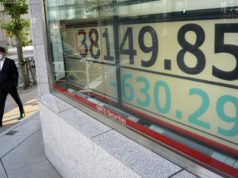Whole Foods shareholders and federal regulators approved Amazon’s $13.7 billion acquisition of the organic grocer, a deal that could bring big changes to the supermarket industry and how…
NEW YORK (AP) – Whole Foods shareholders and federal regulators approved Amazon’s $13.7 billion acquisition of the organic grocer, a deal that could bring big changes to the supermarket industry and how people order groceries online.
By buying Whole Foods, Amazon is taking a bold step into brick-and-mortar, with more than 460 stores and potentially very lucrative data about how shoppers behave offline.
Two moves forward came Wednesday. Whole Foods shareholders gave their blessing to a union that its CEO had called “love at first sight.” And the Federal Trade Commission said in a brief statement that it had looked into competition concerns and would not block the deal.
The FTC investigated whether the takeover “substantially lessened competition” or “constituted an unfair method of competition, ” said Bruce Hoffman, the acting director of the agency’s Bureau of Competition. “Based on our investigation we have decided not to pursue this matter further.”
A union that represents food-industry workers had asked the FTC to scrutinize the deal closely, saying it could hurt competition and lead to job cuts. Regulators tend to block deals when two direct competitors are combining, and Amazon – despite its dominance in the online marketplace – doesn’t currently have a big groceries business.
Still, rivals are scrambling to catch up with the e-commerce giant. Walmart, which has the largest share of the U. S. grocery market, is expanding its grocery delivery service with ride-hailing service Uber and announced Wednesday that it will join forces with Google to let shoppers order goods by voice on Google devices.
Before the deal was announced in June, Whole Foods had been under intense shareholder pressure to improve results and retain customers who have more choices about where to get natural foods. As Whole Foods grew, more supermarkets offered similar organic and natural foods, but at cheaper prices.
Amazon and Whole Foods have not given many details about what might change for customers, though Whole Foods CEO John Mackey gave some general clues at a town hall with employees after the deal was announced. He said he thought Amazon would help with efforts on cost-cutting and a loyalty program. He noted Amazon is known for its innovation and said that company could turn Whole Foods from “the class dunce” to “valedictorian.”
Mackey had said the deal came about after a “whirlwind courtship” and that “it was truly love at first sight.”
As part of the deal, Amazon will pay Whole Foods shareholders $42 for each share they own. That was an 18 percent premium from its stock price the day before the tie-up was announced on June 16. Shares of Whole Foods Market Inc., which is based in Austin, Texas, ended Wednesday at $41.68.
Earlier this month, Amazon.com Inc. sold $16 billion of bonds in order to pay for Whole Foods. Seattle-based Amazon has said it expects the deal to close before the end of the year.
Copyright 2017 The Associated Press. All rights reserved. This material may not be published, broadcast, rewritten or redistributed.






